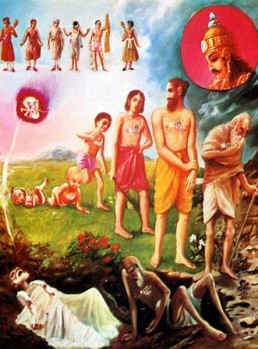Swami Chinmayananda
Swami Chinmayananda Commentary
This is one of the oft-quoted famous stanzas in the Geeta which, by a very striking example, explains to us how the ego-centric entity in an individual readily leaves its associations with one set of equipments, and arrogates to itself another conducive envelopment for living a new set of its required experiences. The example that Vyasa uses is so universal that from the Lord’s own mouth it rings with a note of irresistible appeal.
Just as an individual changes his clothes to suit the convenience of the occasion, so too the ego-centre discards one physical form and takes to another, which will be most suited for it to gain the next required type of experiences. No one will plan to go to his office in his night-gown, nor will he, in his stiff-collar, feel happy while playing tennis in the evening. He changes his dress according to the field where he is intending to work for the time being. Similar is the why and wherefore of death and thereafter.
This striking example, which comes within the comprehension of every one, is made use of by the Lord so that, not only Arjuna, but even those who are over-hearing these eighteen discourses, even at this distant time, may come to understand the idea clearly.
Changing of our clothes that have become worn out, cannot be a pain to anyone of us, especially when it is for the purpose of putting on a new set of clothes. Similarly, when a mind-intellect-equipment finds that its embodiment in a given form can no longer help it to earn, from its available environments, experiences that would facilitate its evolutionary pilgrimage, it feels that this particular form is worn out (Jeerna). This “worn out” condition of a body is to be decided neither by its age nor by its biological condition. Nor can anybody other than its wearer, the ego, decide it.
Critics rise up in hosts, however, against the truth of this stanza and their main platform of arguments is built upon the observed facts of young people dying away in the bloom of their life. In the observers’ opinion, the individual was young and his body was not worn out (Jeerna), but from the standpoint of the evolutionary necessity of the ego concerned, that body was already useless for it. A rich man feels like changing his house or vehicle almost every year, and he invariably finds ready purchasers. As far as the rich owner is concerned, the thing has become useless for him while for the purchaser it is “as good as new.” Similarly, here nobody else can decide, whether a given body is worn out or not, except its “wearer.”
In short, the stanza emphasizes the doctrine of reincarnation which we have already explained in an earlier stanza.
On the whole, it must have definitely conveyed to Arjuna the idea that death grins only at those who have no understanding, and that it has no pain for those who understand its implications and working. Just as changing the dress is no pain to the body, so too, when the dweller in the body leaves the envelopment there is no pain possible; again, undressing does not mean that thereafter we will ever live naked, so too, the embodied Self, ere long, discovers an appropriate equipment from which to function so as to earn for itself new sets of experiences. Evolution and change are all for the mind-and-intellect and not for the Self. The Self is perfect and changeless, and needs no evolution.
WHY IS THE SELF CHANGELESS? THE LORD SAYS:
Adi Sankara Commentary
Yatha, as in the world; vihaya, after rejecting jirnani, wornout; vasamsi, clothes; narah, a man grhnati, takes up; aparani, other; navani, new ones; tatha, likewise, in that very manner; vihaya, after rejecting; jirnani, wornout; sarirani, bodies; dehi, the embodied one, the Self which is surely unchanging like the man (in the example); samyati, unites with; anyani, other; navani, new ones. This is meaning.
The Bhagavad Gita with the commentary of Sri Sankaracharya – Translated by Alladi Mahadeva Sastry
Holy Geeta – Commentary by Swami Chinmayananda
The Bhagavad Gita by Eknath Easwaran – Best selling translation of the Bhagavad Gita
The Bhagavad Gita – Translation and Commentary by Swami Sivananda
Bhagavad Gita – Translation and Commentary by Bhaktivedanta Swami Prabupadha
Srimad Bhagavad Gita Chapter 2 – Verse 22 – 2.22 vasansi jirnani – All Bhagavad Gita (Geeta) Verses in Sanskrit, English, Transliteration, Word Meaning, Translation, Audio, Shankara Bhashya, Adi Sankaracharya Commentary and Links to Videos by Swami Chinmayananda and others – 2-22

